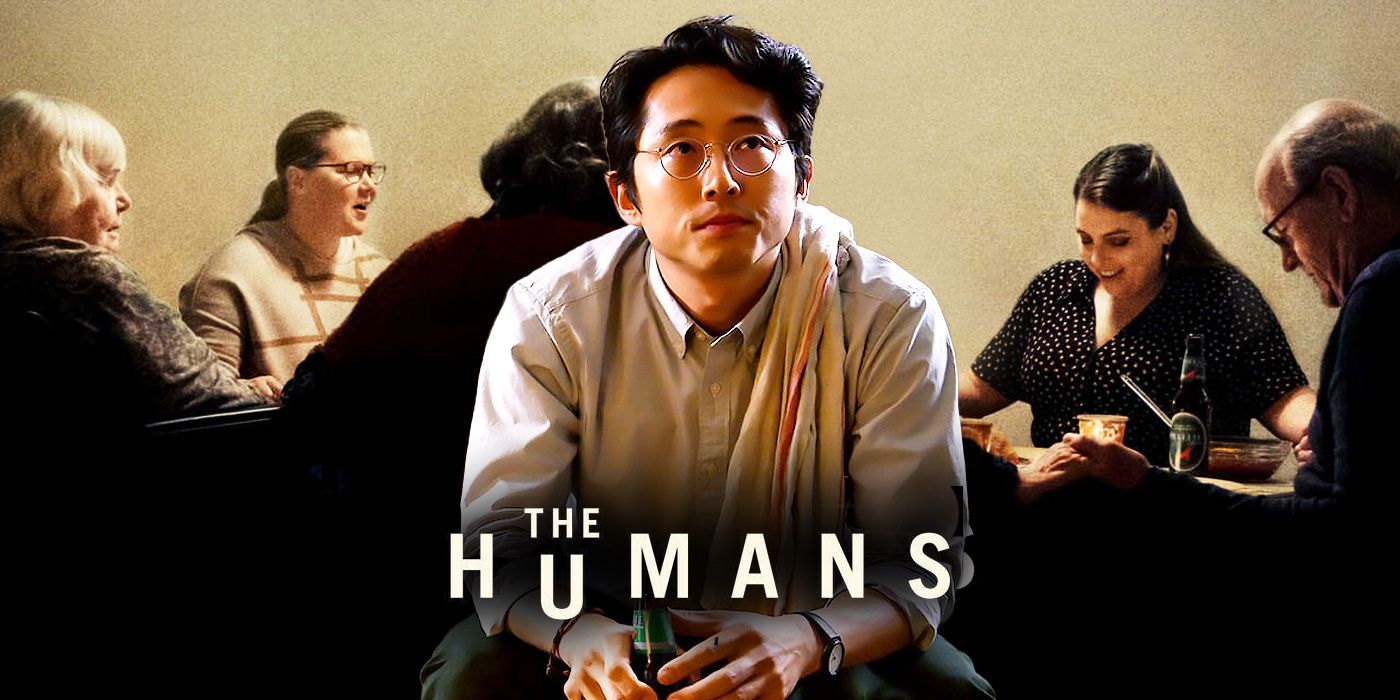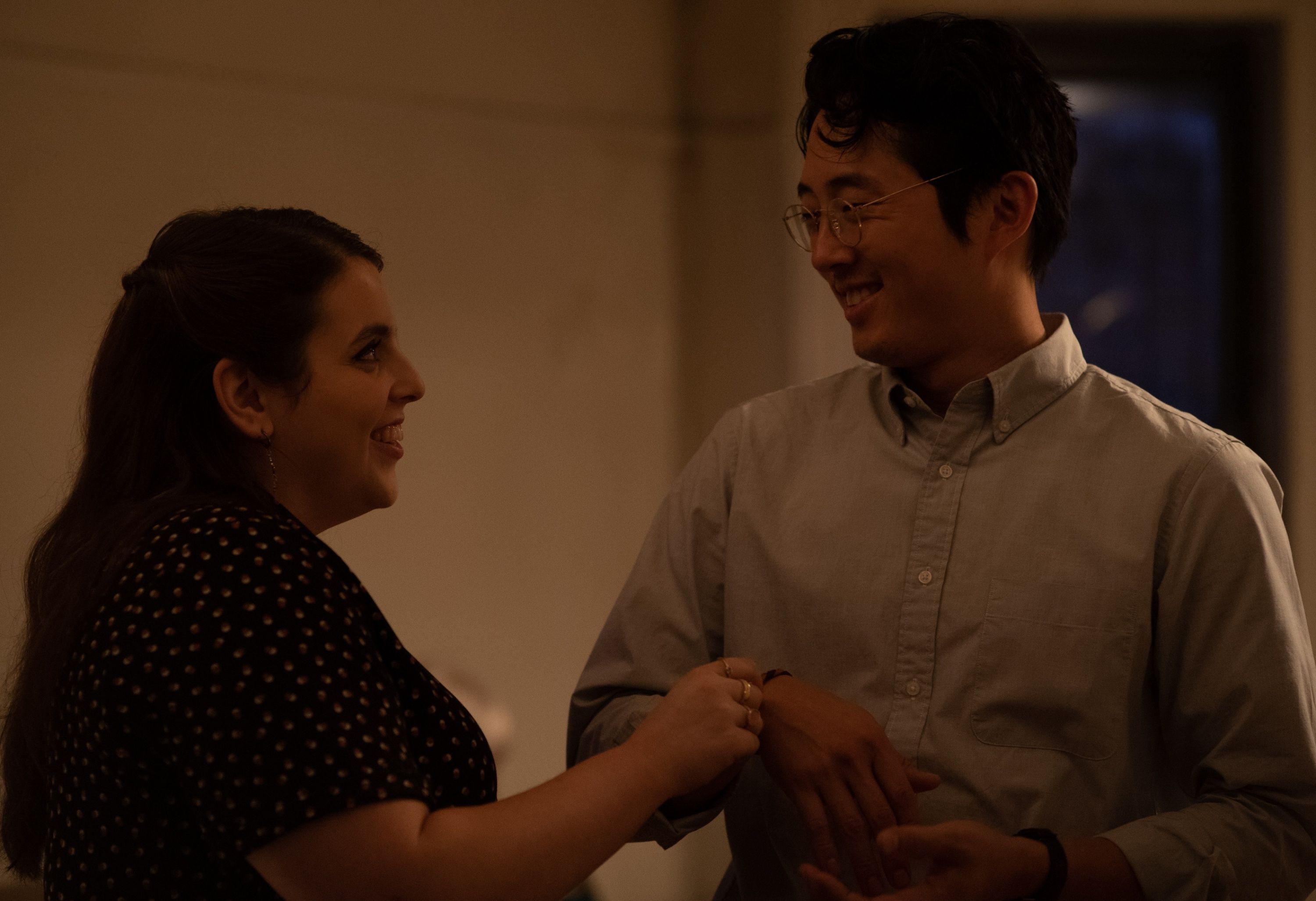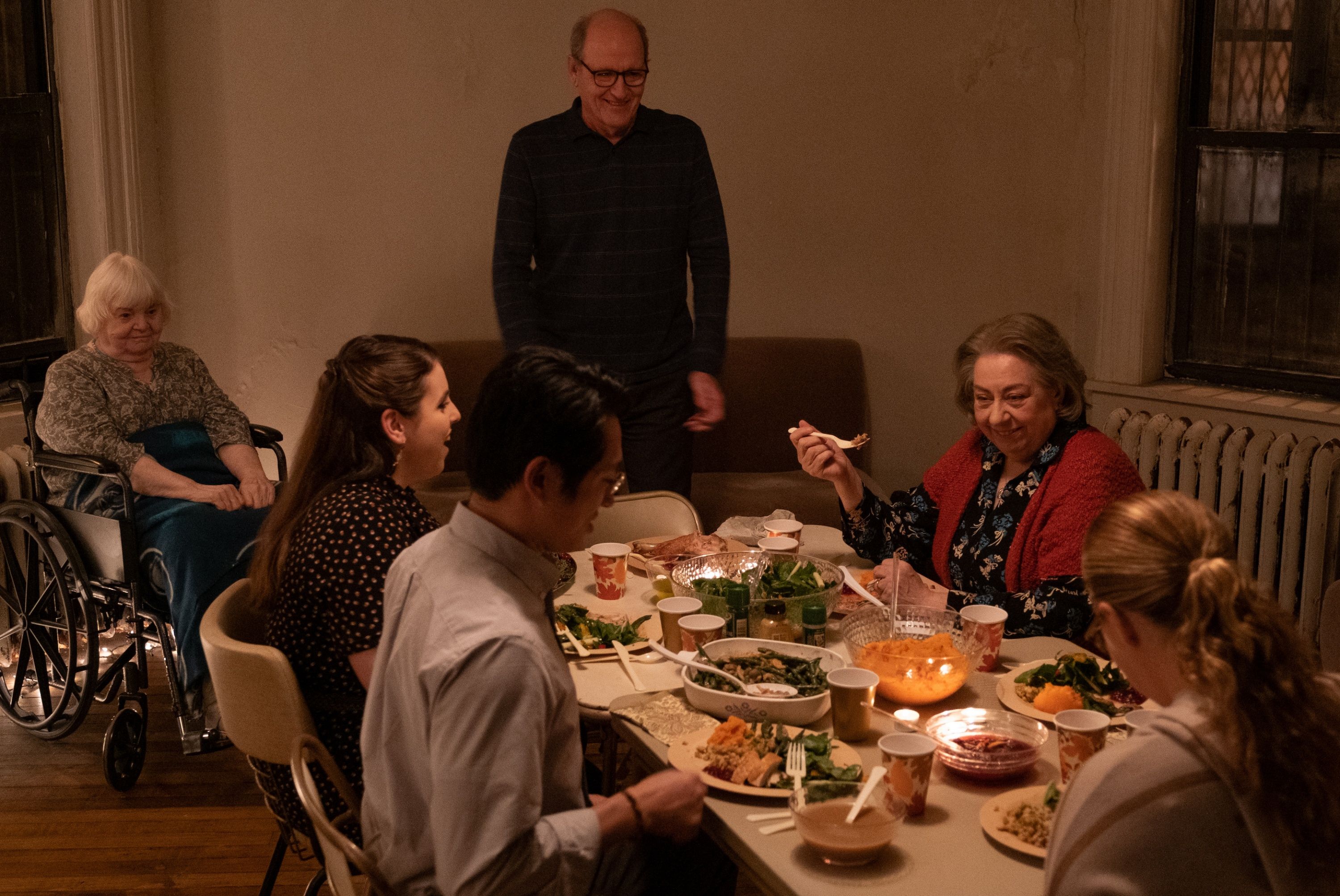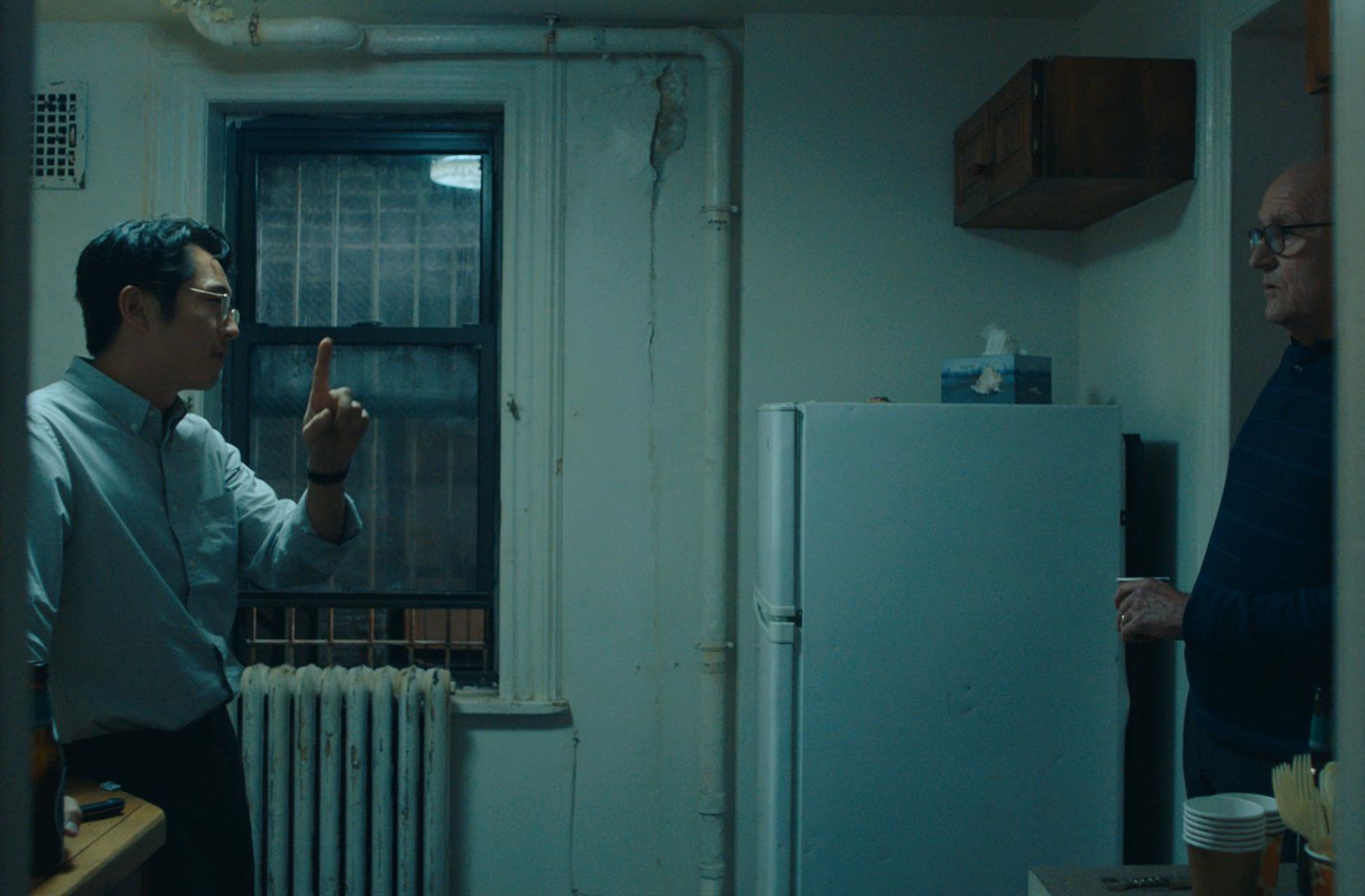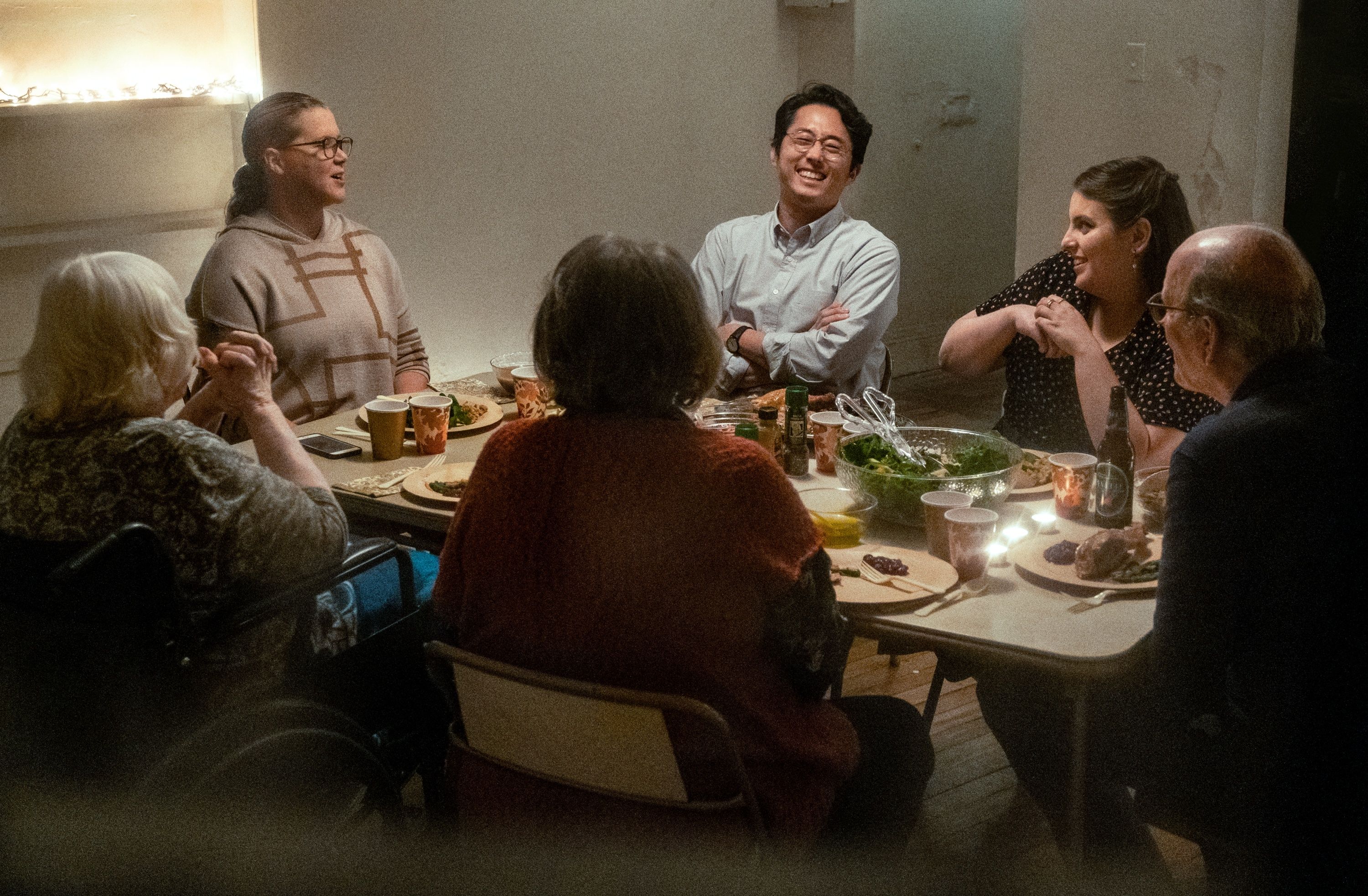From playwright and director Stephen Karam, the drama The Humans (which you can currently stream on Showtime Anytime) follows the Blake family on Thanksgiving, during dinner at younger daughter Brigid’s (Beanie Feldstein) Manhattan apartment with boyfriend Richard (Steven Yeun). While this family – including grandmother Momo (June Squibb), parents Erik (Richard Jenkins) and Deirdre (Jayne Houdyshell), and older daughter Aimee (Amy Schumer) – clearly loves each other, there’s also an underlying tension that allows for a feeling of dread to seep in.
During this 1-on-1 interview with Collider, Yeun talked about shooting Minari and The Humans back to back, why he wanted to be a part of this project, the atmosphere on set, finding the relationship dynamic with Feldstein, and what it was like to do the scenes with the whole cast together. He also talked about how excited he is for Season 2 of the animated series Invincible, how adult animation is really thriving, and getting more involved with producing and developing projects.
Collider: Thank you for talking to me about The Humans. I also have to tell you that I absolutely loved the work you did in Minari.
STEVEN YEUN: Thank you so much.
That was such a beautiful human story about family, and this is also very much a human story about family, just a very different family.
YEUN: Yeah.
What have you found so intriguing about these deeply personal family stories that are really stripped of all the bells and whistles that so many other films have now?
YEUN: I wish I had a rhyme or reason or a method. One thing that people don’t know is that I had finished shooting Minari, and then I had a week rest and I flew to New York to shoot The Humans. I shot those back to back. Not necessarily really comparing the two because I didn’t necessarily see the themes, other than family. Going into it, you realize what maybe both of these films reflect is, yes, our humanity, but also every character isn’t compressed or put upon by another character. It feels like every character is alive in their own reality and you get to watch the clashing of each person’s reality. As a viewer, with Minari, I would see a lot of people identify with certain people and say, “I identify with Monica,” or “I identify with Jacob.” And then, you watch it a second time and you’re like, “Oh, I get Jacob’s perspective now.” With The Humans, you have a similar type of situation, where everyone’s their own entity, just maneuvering the space with each other. As a viewer, you get to attach yourself to whoever you want to.
When this project came your way, what was it that interested you in it? Had you been familiar with the play? Did you know who the cast would be? Was it just reading the script?
YEUN: I knew Richard [Jenkins] and Beanie [Feldstein] were involved, so I was like, “Yes.” What was funny was that my representation, at the time, after I finished Burning, was asking me, “What do you wanna do? What do you want to make?” And I was like, “I just wanna do something human.” And then, a week later, they were like, “There’s this thing called The Humans that they wanna see you for.” I was like, “That’s so crazy.” So, I just took that as a sign and I jumped at the chance. And then, I read the script. Everything you saw, where people were talking over each other or under each other, that was all scripted. That was not improvised. It was very meticulous, how (Stephen Karam, writer/director and author of the play) wanted it to go. But in its execution, it never really felt overly meticulous. It just felt very natural because he had written it so true. He’s very special.
This is such an interesting film because we don’t know anything about any of these characters when we meet them and that’s all peeled back, as the story goes along. What was your first experience reading this like? Was that what reeled you in, as you were reading it and you had those discoveries?
YEUN: I was in awe of how easily the words move and how void they are. What you typically see is so much exposition like, “We’re doing this now,” or “This is happening now.” Instead, it was just conversations. And these were all things we can relate to, like Thanksgiving dinners where you have weird exchanges about expectations versus reality, who other people think you are, who you think you are, how you try to tell them that you’re not what they think you are, and the ways in which we impose on each other. I think we’re just getting to why Thanksgivings are always so gnarly. That was very clear on the page, when you read the script.
This is also a deceptively complex film. It seems so simple with these people just talking to each other, all in one location, but there’s so much going on underneath the surface of everything. What was that atmosphere like? Did you feel that on set? Did you know that it would have something of a horror movie/psychological thriller feel to it when you were doing it?
YEUN: No. On the set, when we were filming it, it largely felt like a Thanksgiving dinner. The horror aspect, for me on a personal level, was that with Richard being slightly an outsider to the family, he’s able to pick up on a lot of things. He can see when Deirdre is hurt. He can see when Erik is being awkward and when he’s panicking. He can see when Aimee is being aloof. He can see it all, and that is a horrifying position, in and of itself. You could tell what he was trying to build by the way he was shooting it and place that he constructed. Stephen Karam truly is super talented. The way in which he was approaching it was something I had never really seen before. When I watched the film for the first time, I really felt like I had witnessed a play. It felt like he took play language that leaves you with the feeling of immersion after you leave it. He didn’t transpose it one-to-one, which we see even in [David] Mamet play, where he tries to make it into a film and sometimes it looks like he just filmed the play. With this, it felt like he used film language to accomplish the same goals that theater allows. The first time I watched the film, I was like, “I feel like I just watched a play. I feel the feelings of having been in the room with them, that you normally get when you’re at a live performance.” That was really crazy to me.
What was it like to do the scenes when the whole cast is together? What are your favorite memories of getting to explore and play in those moments? When you’re sitting in a room with talent from June Squibb to Richard Jenkins to Amy Schumer, all with such different backgrounds, what is that like to experience, as an actor?
YEUN: After the fanboy stuff goes away, largely it’s just about trust. You know that these are professionals, you know that these are very talented individuals, and you just have this trust. You just believe them because they’re so good. Each scene felt really effortless because it just felt like all you had to do was listen and respond, and everybody else was gonna carry their words for you. Those are dream casts to be a part of.
Did you spend time having conversations or rehearsing with Beanie Feldstein on this, or was it just jumping in and finding it in the moment?
YEUN: We had eight days of prep, and we would have table reads and discuss our characters with each other. Some of us would talk with Stephen. But Beanie and I never really overly cracked down on who our characters were to each other. We just tried go in raw. These two people are in a relationship and love each other, but each one is also imposing themselves onto the other. There’s a very specific way that I look at Brigid, and Brigid looks at Richard in a very specific way, and that’s just so true. I can form my own opinions about somebody, that they might not even see for themselves, so we went with that. At some point after the prep, we just largely jumped in and went with it. That’s what was really cool. It was just about trust.
I love that you’re doing these films that are such human stories and these characters you’re playing are such fascinating character studies, and then you can still go voice a character like you do for Invincible, which is wild and crazy, and people really responded to that show. What is the status of Season 2? Have you done any work on it yet?
YEUN: We haven’t started. I know we’re starting at some point soon. I’ve talked to Robert [Kirkman], here and there. He’s super excited about it. He thinks Season 2 is gonna be even better than Season 1, which I have no doubt about. If you go to his source material, Invincible is an incredible comic, and just thinking about how much story hasn’t been told from that run, it’s gonna be bonkers. I’m really excited about it.
Are you surprised at how strong the reaction’s been, or did you expect that because of the source material?
YEUN: I’ll be honest, I did not expect this level of response. People really enjoyed the show. That’s not to say that I thought the show wouldn’t be enjoyed. I just didn’t know how many people were coming to it like that. To me, I think it speaks to America’s appetite now for adult animation, which is really cool. I grew up on it. I think all of us, of our generation and below, grew up on it. Largely, our programming was dictated by the generations before us, that didn’t necessarily love animation that way. We’re in a weird, cool time where I’m seeing so many kids watch anime and so many people watch adult animation. People are learning about Don Hertzfeldt. It’s thriving. I think we’re probably on the precipice of right before things really pop off. I think we’re gonna get some hopefully [Hayao] Miyazaki levels of animation. We do with Pixar, but I just mean coming from different places. It’s a new world. It’s certainly all brand new.
What’s it been like for you to get more involved behind the scenes, producing and developing projects? Has it changed what you want to do, as an actor?
YEUN: No, it hasn’t actually really changed what I want to do, as an actor. If anything, it’s really refined it to understand that I wanna occupy certain lanes at certain times. Producing, for me, is something that I take pretty seriously, in the sense that I wanna produce. I don’t necessarily wanna produce for me. I just wanna help produce. It’s been really encouraging to know that my hunches were right. There are a lot of voices that are really special, that haven’t had a chance to tell their stories yet. I’m excited for the things that we’re working on because there are a lot of interesting people that I’ve gotten to meet, that have really interesting stories to tell. We’re getting closer and closer to being able to do that. It’ll be interesting. I think it’ll be cool.
How do you know when you find someone who’s work you want to produce or a project that you want to produce? Are you looking for something in particular, or is it just a gut feeling?
YEUN: I don’t wanna spoil this yet, but there was one person where I watched a sketch that he did online and I thought it was so good. I wanted it six or seven years ago. I saw that he had a Tumblr and I messaged him and was like, “Hey, this is so good. I’d love to meet you.” So, we met up and he came to me with a pitch for a story and a show that he wanted to make. I was like, “Let’s make it,” but I had no path to do that, at the time. I didn’t have a company or the backing of a studio, or anything like that. But then, as I started to progress and got the opportunity to have that structure, I realized that I had been holding onto a lot of stories and a lot of connections with people, and this opportunity is affording me the ability to help tell their stories. It’s all working out. It’s stuff that I’ve had from the past. It’s people that I’ve met from the past. It’s people that I meet now. It comes from all directions. There’s so much stuff on the internet now, it’s endless.
Do you feel like, as an actor, you’re in a place where you want to be? There’s always the point in a actor’s career where they can stop taking any role just to work and they can actually focus on the roles they want to do. Do you feel like you’re more in that place now?
YEUN: Yeah. I was so blessed to have a sense of security, coming off of The Walking Dead. I still have to put food on the table, so I still do have to work, but I realized that, for me, there are costs to these things. If I’m always working, trying to pad my wallet or do whatever I need to do to live a specific type of life, that comes at the cost of my family. It’s not necessarily that I’m super picky because I’m looking for interesting work. I’m down for a lot of things. It’s largely about whether I can do it and whether I can take four months away in London, away from my family, to do this movie. No, I can’t because that would be terrible for my kids and my wife? Then, I’m okay staying home. Those are very easy decisions. That’s not too agonizing. And then, there are ones that are like, “Hey, do you wanna step away for a month and do this? It’s really great. Let me check in and have a discussion with my family. Okay, I’m gonna go for a month and do this thing. That’s largely how it’s been working for us.”
After doing these projects, would you like to do more comedy?
YEUN: I’d love to do comedy. That’s where I started. I just took a detour, not because I don’t like comedy. Comedy is different now too. I feel like we’re at the point where a lot of interesting, weird, funny stuff is about to happen. I just want Billy Madison back. If there’s a Billy Madison movie out there, I’ll be in that. I miss that era. I’ve just been waiting to see what’s out there.
The Humans is available to stream at Showtime Anytime.

